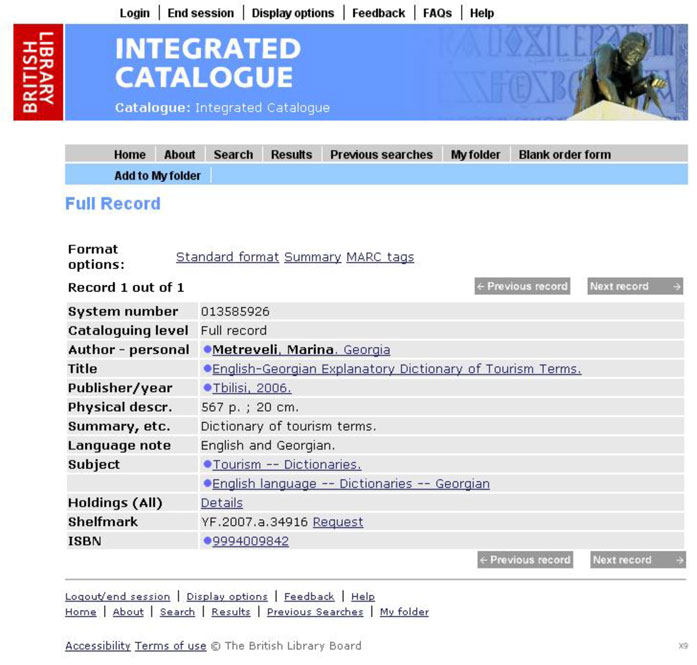The book deals with the sustainable development of ecotourism and its relationship with the environmental protection issues; ecotourism, as the basis for the tourism sustainable development, its environmental principles and characteristics; ecotourism planning and management; and measures to minimize the environmental pollution. The annex to the work contains the exemplified information about the activities of the governmental, non-governmental and private organizations and investors and their ecotourism products. There is a tourism terms explanatory dictionary at the end of the book.
The work is destined for the students and teachers of the tourism faculty, specialists employed in the field of tourism and a wide population interested in the tourism and environmental issues.
British Library Integrated Catalog
From the Author
On the background of advance of technique and extensive exploitation of natural resources, maintaining the optimal condition of the environment is a single provision to survive the mankind. Hence, protection and maintenance of the environment, natural resources and cultural heritage is important not only on the local level, but globally as well.
The world’s cultural and natural heritage is one of the most important factors of the development of environmental tourism or ecotourism. This is an important recreational resource, sound exploitation of which is a prerequisite for the economic growth of the country and harmonious development of the regions.
Ecology is closely related to all sectors of the economy. In this regard, tourism is no exception. Development of ecotourism is very important for sustainable tourism development, which means that one of the priorities of tourist activities is a careful use of environment. The concept of ecotourism encompasses a wide range of travels from cognitive tours for pupils to regular visits to national parks and reserves.
According to the prognosis made by experts of the World Tourism Organization, in the XXI century, many countries, especially the developing ones, throughout the world will gain high economic benefit from the development of ecotourism, which will promote the economic growth of these countries, especially in the mountain regions.
The goal of the given work is to introduce to students of tourism department, practitioners engaged in this sector and all others concerned the meaning of ecologically sustainable environment in tourism and the roles of ecotourism, as one of the principle components of the sustainable development of tourism, the impact of tourism on environment and its outcome, the roles of local population, government and private sector the development of ecotourism in the region, planning techniques of contour, safety measures for tourist and management of tourist services. The annex provides information on ecotourism activities and products developed by governmental, non-governmental, private organizations and investors in Georgia. The book also comprises Glossary.
The book will help the reader to not only understand the ecotourism issues, but also to change his/her behavior towards the environment and as a potential tourist be guided by the 10 commandments of ecotourism, compiled by the U.S. Association of travel agencies on environmental protection.
ASTA’s ten commandments on ecotourism
Whether on business or leisure travel:
1. Respect the frailty of the earth.
2. Leave only footprints. Take only photographs.
3. To make your travels meaningful, educate yourself about the geography, customs, manners, and cultures of the region you visit.
4. Respect the privacy and dignity of others.
5. Do not buy products made from endangered plants or animals.
6. Always follow designated trails. Do not disturb animals, plants or their natural habitats.
7. Support conservation-oriented programs and organizations.
8. Walk or utilize environmentally-sound methods of transportation.
9. Patronize those who advance energy and environmental conservation; water and air quality, recycling; safe management of waste toxic materials; noise abatement; community involvement; and which provide experienced, well-trained staff dedicated to strong principles of conservation.
10.Identify those organizations, which subscribe to ASTA Environmental Guidelines for air, land and sea travel.
Editor:
Onoproshvili D. – Doctor of Economics
Reviewers:
Kajaia G. – Doctor of Biological Sciences, Professor
Khelashvili I. – Doctor of Geographical Sciences, Professor
Gugunashvili Z. – Professor

I work for a ecological park in Puerto Morelos, Mexico, and most difficult part of my job is educate the people, even if they have the best intentions.
საინტერესო წიგნები ჩანს და აუცილებლად გავეცნობი. მაინტერესებს წელს ან შარშან თუ დაიბეჭდა რაიმე ახალი?
გამარჯობათ სად შეიძლება ამ წიგნის შეძენა? ძალიან მჭირდება..
მ. მეტრეველი – ტურიზმი და გარემოს დაცვა, თბილისი, 2008